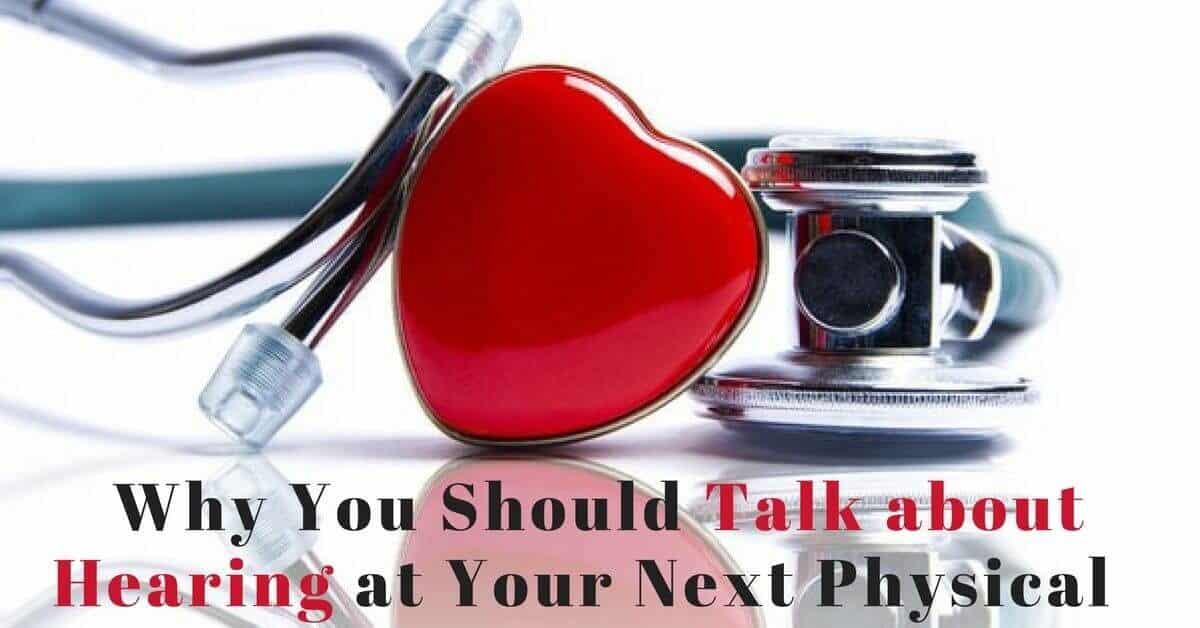Are you one of those people that looks after your health, and goes for a yearly physical to make sure everything is ok? That’s great! It’s recommended that adults over the age of 50 have a physical exam once a year, even if they’re feeling fine. Early diagnosis and intervention means you’ll never be caught off guard, and can catch an illness or disease before it becomes a major issue. But did your last physical include a hearing assessment?
What’s Included in a Physical
A yearly physical usually includes updating your health history, and checking all your vital signs including blood pressure, heart rate, and respiratory rate. Your doctor will also check your eyes, ears, nose, throat, chest, abdomen, and nervous system functions to make sure everything is functioning normally. They even order blood work, so your doctor can check up on your kidneys, liver, and immune system. However, only about 30% of adults say they had a hearing assessment as part of their regular physical. With all of these tests, it’s surprising that your family physician doesn’t check your hearing!
Why You Should Talk About Hearing at Your Next Physical
Even though few doctors check your hearing, hearing health is closely linked to your overall health and wellbeing, as well as your happiness and quality of life. Recent studies have linked hearing loss to many of the major health issues that plague Americans, from diabetes and cardiovascular disease to kidney disease, arthritis, sleep apnea, hospitalization, a greater chance of falls, depression, cognitive decline, and dementia. If talking about hearing loss or wearing hearing aids would make a difference in all these other areas, who wouldn’t want to talk about their hearing health?
Hearing Loss and Communication: For those living with hearing loss, losing the ability to communicate is often the most challenging, and leads to the worst health outcomes. A recent study by the Better Hearing Institute found that adults who wear hearing devices to treat hearing loss are optimistic about the future, have an active social life, rate themselves as being happier and more engaged in their life, and dive head first into problems or challenges with confidence.
Those with hearing loss lose their social connections, have difficulty communicating, and often choose to stay home rather than meet with friends. They struggle with feelings of loneliness and isolation, and there’s a strong link between hearing loss and depression. Those with untreated hearing loss start to experience more rapid cognitive decline due to lack of social contact or engagement in life, and risk an earlier onset of dementia.
The Financial Burden of Untreated Hearing Loss: We often think about the cost of investing in hearing aids, and think it might be easier to simply live with hearing loss. But hearing loss often has a negative impact on your finances. Not only does hearing loss affect your job performance, risking your income, it also increases your health care spending. A study published in the JAMA Otolaryngology journal found that middle aged adults with hearing loss spent far more on health care than their hearing peers, and visited the doctor more frequently.
If you want to visit the doctor less often next year, a good first step would be asking your physician to check your hearing.
Ask About Your Hearing
Diagnosing and treating hearing loss early is great for your hearing health, and you’ll be able to enjoy easy communication without worrying about the impact of severe hearing loss. Not only that, but if you talk to your doctor about your hearing you’ll maintain your overall health, prevent future health problems, and increase your quality of life.
Unfortunately, your doctor isn’t likely to talk about your hearing loss. It’s up to you to start that conversation, and ask for the help that you need. For a few tips on how to talk to your family physician about your hearing health, the Better Hearing Institute created a free booklet, available at http://www.betterhearing.org/news/how-talk-your-doctor-about-hearing-loss.
For more information on how hearing loss can impact your life, or ways hearing devices can change your future, visit us at My Hearing Centers today. Our team of hearing specialists will provide you with a hearing assessment, and great advice when it comes to picking out the best hearing aid for you.


